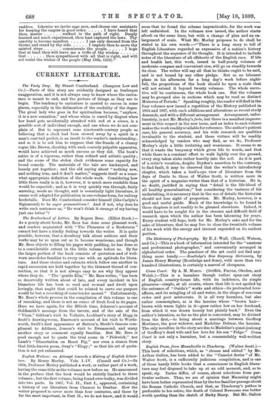The Brotherhood of Letters. By Rogers Rees. (Elliot Stock.)— As
a gossip about books, Mr. Rees has done some pleasant work, and readers acquainted with "The Pleasures of a Bookworm" cannot but have a kindly feeling towards the writer. It is quite possible, however, that a desultory talk about authors and their works may be so spun out as to become wearisome, and though Mr. Rees objects to filling his pages with padding, he has done so to a considerable extent in the little volume before us. By far the larger portion of the book consists of quotation and of well- worn anecdotes familiar to every one with an aptitude for litera- ture. And these stories and extracts which follow one another in rapid succession are held together by the thinnest thread of con- nection, so that it is not always easy to see why they appear where they do. "The gentle Ella.,'" Mr. Rees writes, "has been so deservedly written about of late, and every incident in his blameless life has been so read and re-read and dwelt upon lovingly, that aught that could be related to serve our purpose would be but a recooldng of some tender morsel." Unfortunately, Mr. Rees's whole process in the compilation of this volume is one of recooking, and there is not an ounce of fresh food in its pages. Here we have again, for the fiftieth time, Johnson's account of Goldsmith's message from the tavern, and of the sale of the "Vicar," Gibbon's visit to Voltaire, Locklart'a story of Hogg in Scott's drawing-room, Emerson's account of his visit to Words- worth, Swift's first appearance at Button's, Steele's famous com- pliment to Addison, Jonson's visit to Drummond, and many another story or comment equally familiar But Mr. Rees is good enough not to quote the trial scene in "Pickwick," nor Lamb's "Dissertation on Roast Pig," nor even a stanza from that little-known poem, Gray's "Elegy;" so that his art of quota- tion is not yet exhausted.


































 Previous page
Previous page